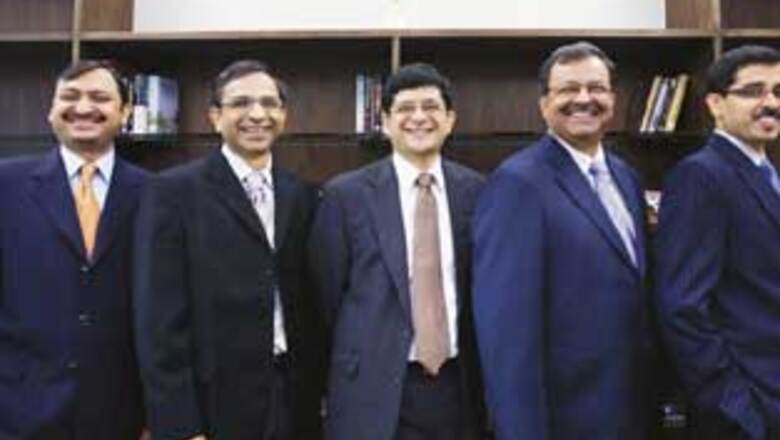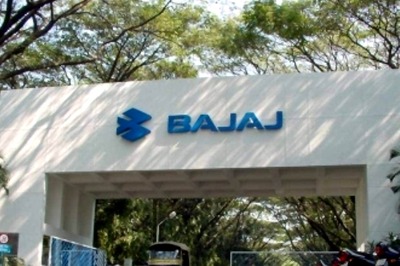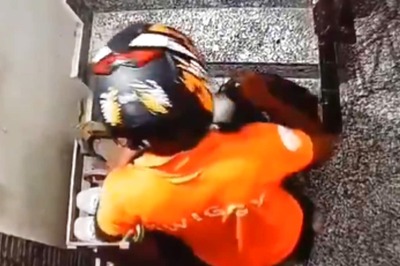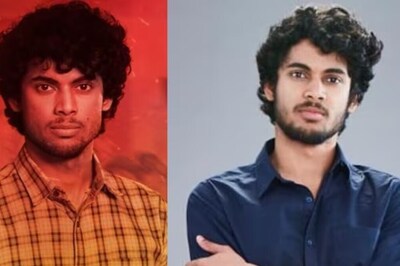
views
Neeraj Gupta was getting ready to fold. His company V-Link had enjoyed five years of sensational growth supplying cars and buses to BPO companies to ferry their staff. Then competition arrived, growth slowed and it appeared that the company would "hit the wall" in a few years. Perhaps it was best to sell, take the cash and get out.
"My advisors had lined up a few potential investors," says Gupta.
That's how he met Vikram Nirula of India Value Fund Advisors (IVFA). Nirula looked at the deal and turned it down. "I told him that apart from the fleet business I was also planning to get into radio taxis. Vikram told me: ‘If you get the license then let's talk'," says Gupta.
Two years later, Gupta is still here. While his company is called V-Link, you are more likely to recognise it as Meru Cabs, the branded radio taxi service which is today India's largest such company. Even though Gupta no longer has majority control over the company he founded - IVFA has - he is busy strategising on how to get Meru Cabs into new growth areas.
While there are more than 200 venture capital and private equity funds operating in India, you would be hard pressed to find one like IVFA. This firm likes doing control or buyout deals, where the fund owns more than 51 per cent of the company. That's not rare because many funds in India do that (see table). What makes IVFA unique is that its buyout transactions are with small companies that have a turnover of Rs. 50 crore to Rs. 100 crore. Most venture firms in India would much rather pick a great entrepreneur, invest in a minority stake and wait for the returns. The folks at IVFA are able to convince the promoter that even if he loses control, he would be part of a much larger business.
Before they invest, they spend so much time looking at a deal that by the time the process ends, they know as much about the business as the entrepreneur does. "In one deal they spent more time than all other 10 funds put together on due diligence. The entrepreneur gave up but said that they come to my office daily and by now know more about my business than me!" says Deepesh Garg, Director, O3 Capital, an investment bank.
CEO IVFA, Vishal Nevatia, smiles and says, "At the time of buying any business, we leave no stone unturned in getting to know the business well." Vikram Nirula, co-founder of IVFA, adds the corollary. "When in doubt, dig deeper," he says.
Nevatia and Nirula were both working in Arthur Andersen before they quit in 1999 and founded GW Capital, the forerunner to IVFA.
"Gary Wendt [ex-GE] who originally conceived the firm, had a strategy of generating long-term sustainable returns through operational excellence and business transformation. We have stayed true to that principle," says Nevatia.
Ability to get down to the shop-floor was a must. Sanjay Arte (Saint Gobain and Johnson & Johnson) and George Thomas (BPL, Warner Lambert and Hindustan Unilever), were head hunted into the firm. To boost their investment team Sunil Theckath from ICICI Ventures was taken on board. Rajeev Agrawal (who is no longer with the firm) also joined the team around the same time.
"We were lucky that HDFC, Ambit and Impala Partners let us pursue our strategy even when we had hitches," says Nevatia.
Though venture funds are highly secretive about their business there are three ways to assess their performance. The first is whether the businesses they fund improve their market position. Three of IVFA's current portfolio companies are among the market leaders in their segment. Meru is the largest radio taxi service in the country. Radio City is among the top three radio businesses by size. RDC Concrete is the fifth largest ready-mix concrete company in the country.
The second is whether investors like the fund managers' work and give them more money. IVFA has raised four funds till now, each bigger than the one before. The last fund of $725 million this July was raised at the recession's peak. "Of course, the investors love them. Western investors like the control and the buyout model," says a private equity fund manager.
The third metric is a balanced and stable top team. The five founding partners of the firm have stuck together for 10 years now. Two years ago, two new partners, Mahesh Krishnamurthy and Pramod Kabra joined them. Theckath, Nirula and Krishnamurthy look at investments while George Thomas, Sanjay Arte and Pramod Kabra troubleshoot businesses. Nevatia looks at fund raising and strategy.
So what's the IVFA secret sauce? Ask any of the IVFA partners and they will say "because we love building businesses." Unfortunately, this is exactly what most venture funds say. So how and why is IVFA different?
For an answer, consider IVFA investment in CARE Hospitals way back in 2002. Sanjay Arte didn't know anything about hospitals but "plunged right in." He figured the team of doctors at CARE were great but hadn't thought hard enough about hospitals as a business.
"So we worked together to develop something as simple as a budgeting process because there was none. I would go from doctor-to-doctor to ask them how much business they did and the costs they had incurred. And using that built a projection for expected business and expenses for the coming year," he says.
PAGE_BREAK
It was a big one-time effort but in forthcoming iterations, the budget became a great source of management information system as well. The other thing IVFA did was to improve the patient discharge process.
"This got delayed because nurses had to wait for doctor approval to give unutilised medicines back to the patients. We let the nurses do that without needing too many approvals. The benefit of a quick discharge outweighed the costs of nurses giving back a wrong amount," says Arte.
A few years earlier, in 1999, IVFA had invested in Shringar Films (now Fame India), a family-run film distribution business. Shravan Shroff, MD of Fame, says he accepted their investment because "they were going to be a partner in the business." IVFA helped recruit many key middle management professionals in the company.
"My head of business development, head of IT and head of projects came through their inputs. Most of these guys are still with me," says Shroff. While the regular movie business through a multiplex was where Shravan and his family's insights were most useful, Thomas, an ex-HUL man and a partner at IVFA, had other things to worry about.
"I had come from a foods background and for me the real challenge was to build a Rs. 1-2 crore business selling popcorn and chai for a film turnover of Rs. 10 crore," he says. The team worked so closely that as Arte puts it, "I think Shravan spent more time with me than with his wife. I had his number on my ‘friends and family' free calling list."
In all these investments IVFA only had minority stakes. In 2004, IVFA finally landed a deal, Trinethra, which now defines the way IVFA works. K. Anjaneyulu, the founder of Trinethra, had grown the company to being a leading organised retailer in Hyderabad but had not been able to take the model further. Theckath in his earlier stint at ICICI Ventures first funded Anjaneyulu. He convinced Anjaneyulu to take IVFA as a majority investor to help Trinethra recruit top talent and build business processes and systems.
"Professionals don't want to join a small company because if they fall-out with the promoter they have to leave. If IVFA has control then they are more confident," says Nirula. IVFA put in $10 million for a 50 per cent stake.
IVFA got in Pranab Barua, former Reckitt Benckiser and HUL senior manager, to head the venture. Trinethra increased its store numbers three times in two years and in January 2007 sold the business to Aditya Birla Retail and made twice the invested amount. It is IVFA's biggest success from its second fund.
Now the elements of the IVFA playbook are clear. First, find a business that has real long-term potential. This means no fads. Second, convince the promoter that the business will grow manifold if IVFA holds majority stake. After the deal bring in good quality managers and install top systems and processes. Third, look for an exit either through sale or an IPO.
Having tasted success with Trinethra, has IVFA taken on too much risk? A key concern is that the fund is taking on too much of the entrepreneurial mantle.
IVFA owns almost 100 per cent of Radio City and RDC Concrete, close to 70 per cent of V-Link and more than 51 per cent of Inlogistics. All these companies are in their infancy and need entrepreneurial passion and energy to "play through pain" to become large. "Take for example Inlogistics. It is in a very competitive market of 15 players and where may be two or three will survive. Without an entrepreneur/CEO like Sankalp Shukla [Inlogisitics CEO] how will the business scale?" says Jayesh Desai, national director, infrastructure & real estate, Ernst & Young.
Nevatia is shocked by this comment. "What makes you think we are not passionate about our businesses? In one company where we had 60 per cent stake, the entrepreneur left. One of us went into the company and pulled in 18-hour days for more than a year till the company could be handled by managers," he says.
Take Inlogistics, a rail logistics company. "We have relentlessly focused on building out the North-East [rail] route, primarily the steel sector. We are trying to build a frequency of one rake a day from one a week that we started," says Pramod Kabra, partner, IVFA and engagement manager for Inlogistics.
Great strategy and execution but what if the western freight corridor opens up? Entrepreneurs exhibit speedy opportunism that allows them to turn their company on a dime. "Sometimes a perfectly good investment runs into trouble due to extraneous factors. Can the professional team exhibit the passion to stick it out?" says Rahul Chandra, director, Helion Venture Partners, a venture capital fund.
IVFA has been through one recessionary cycle. That was the post-dotcom collapse of 2000 when the fund only had minority stakes. This time, the investment and the execution risk both are theirs. "I will be the first one to admit that ours is a work-in-progress. It will take us at least another seven years to really prove our business model," says Nevatia.
To be fair though, IVFA has a couple of things in its favour. One, it is well-capitalised to support its companies with extra equity should they need it. "We are looking to just three-four deals a year. In the 10 years that we have been around we have seen 1,500 deals and made 17 investments," says Nevatia. The other thing in IVFA's favour is that should thing turn sour, they can always sell because they have majority control. A professional machine that is passionate about a business and manages to exit it dispassionately - that's an paradox worth waiting for.




















Comments
0 comment